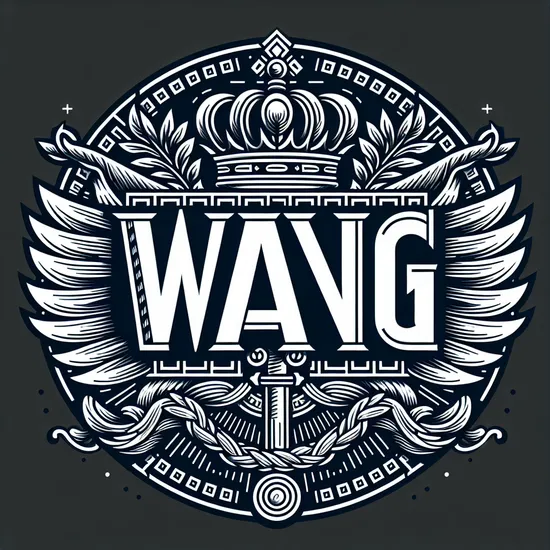Wang - Unveiling Name Meaning, Origin, and Popularity
Understanding the Meaning of the Name Wang
The name Wang primarily signifies a powerful position, often meaning "king" or "monarch" and symbolizing authority and leadership. It emanates from the ancient cultures where the title was bestowed upon rulers and significant figures, highlighting its meaning of strength and dominion. The meaning instills an inherent sense of regality and responsibility.
Find more names related to the name Wang.
Leader,
King,
Chinese,
Pronunciation of 王 in Chinese
wɑːŋ - 王
- /wɑː/: pronounced like the word "wah"
- /ŋ/: pronounced like the ending of "sing"
For English speakers, pronounce "Wang" as "wahng," with a soft "a" and a nasal ending.
Tracing the Origin of the Name Wang
Originating from Chinese culture, the surname Wang was common among royalty and aristocracy. Written with the character 王 in Chinese, Wang holds historical significance as it was typically associated with noble lineages, implying power and esteemed standing within Chinese dynasties. Its prominence in Asian cultures signifies its widespread traditional value.
Gender Neutrality and Perception of the Name Wang
The name Wang is distinctly gender-neutral. It bears a universal applicability across Chinese culture, used for both males and females expertly. While less common as a first name in western cultures, the surname is prevalent globally. Notable people like male tennis star Michael Wang and female actress Wang Yu showcase its appeal across genders.
Charting the Popularity of Wang Globally
The name Wang, as a surname, ranks among the top in the world, particularly prevalent in China where it is listed as one of the most common surnames. Globally, the name maintains a consistent presence, with significant footholds in areas with large Asian communities. Over time, its prominence has grown as global migration trends have spread it beyond China’s borders.
Worldwide Use and Adaptation of the Name Wang
Wang is recognized widely across numerous regions, especially in China and Taiwan. In western nations like United States and Canada, it’s largely maintained as a surname. Cultural interpretations can alter pronunciation, with modest changes noted in Japanese contexts. Notably, it serves as a bridge in honoring heritage, regardless of the locale.
| Global Distribution and Gender Ratio of the Name Wang |
| Country |
Usage % |
Female % |
Male % |
| CN |
37.31% |
24.07% |
75.93% |
| SG |
11.33% |
29.23% |
70.77% |
| MY |
10.72% |
30.89% |
69.11% |
| US |
8.54% |
34.69% |
65.31% |
| TW |
6.63% |
34.21% |
65.79% |
Country-specific gender and popularity analysis is derived from data provided by
Gender API.
Common Traits and Characteristics of Individuals Named Wang
- Leadership: Individuals named Wang are often perceived as natural leaders, drawing respect from peers and communities.
- Wisdom: Known for their wise decision-making, they exhibit qualities of fairness and acumen.
- Resilience: Demonstrates strength in overcoming challenges, reflecting traditional cultural strength.
- Loyalty: Hold strong bonds with family and friends, placing value on relationships.
Professional Tendencies of People Named Wang
- Governance: Drawn to careers in leadership roles within government or corporate structures.
- Academia: Many enter fields that involve research, education, and intellectual pursuits.
- Healthcare: Compassion leads some towards medicine and caregiving professions.
- Technology: A significant number succeed in tech fields, leveraging analytical skills.
Fascinating Aspects of the Name Wang
- Cultural Ties: Strong association with Asian dynastic history and literature.
- Pop Culture: Featured in films like 'The Joy Luck Club,' reflecting its cultural resonance.
- Historical Figures: Wang Ch’ung was a notable Han dynasty philosopher, exemplifying historical prominence.
- Astronomy: It is the name for a crater on the moon’s far side, showcasing its celestial ties.
Notable Individuals Bearing the Name Wang
- Wang Yibo: Chinese actor and singer famous for his roles in popular dramas.
- Wang Liqin: Renowned Chinese table tennis player with multiple world titles.
- Wang Jianlin: One of China's wealthiest entrepreneurs, known for his work in real estate.
- Wang Ping: Acclaimed author and academic, recognized for her contributions to Chinese-American literature.
Similar Names
-
Huang: A name with a somewhat similar sound, meaning "yellow" or used symbolically for the emperor.
-
Chang: This name often means "prosperous" or "long," associated with strength similar to Wang.
-
Zhang: Another phonetically close name often meaning "archer," sharing cultural significance.
-
Yang: Holds a similar phonetic tone, meaning "sun" or "poplar tree" in some contexts.
-
Chu: Means "pearl" or "red," offering a subtle association with prestige and value.
-
Feng: This name means "phoenix," symbolizing rebirth and strength much like Wang.
-
Qin: Represents "ruler" or "king," staying in line with Wang's overarching leadership theme.
-
Min: Often symbolizes "smart" or "clever," pairing with the wise characteristics of Wang.
-
Shen: May mean "deep" or "spirit," resonating with the depth commonly attributed to Wang.
-
Guo: A name a meaning "nation" or "country," aligning with Wang's thematic royalty.
